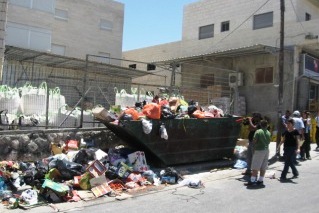 Sanitation conditions in East Jerusalem
Sanitation conditions in East JerusalemWhile much of the attention Jerusalem receives at home and abroad is centered on political affairs and predicaments, the extent of human rights violations and neglect suffered by its Palestinian residents remains only partly known. Residents of the city, both Jewish and Arab, are often surprised when presented with the full, bleak picture. Jerusalem’s Arabic public school system is in need of 1,000 more classrooms. Half of the Palestinian residents do not have legal and adequate connections to the water system. Sixty-five percent of Palestinian families live below the poverty line — double that of the Jewish population. A chronic shortage in sanitation facilities, post offices, welfare services and medical centers exists in all Palestinian neighborhoods. Illegal law enforcement measures are employed too often by the Israeli police operating in Palestinian areas, including violence and harassment, unwarranted restrictions on freedom of movement and disregard for laws concerning interrogation and arrests, including of children as young as 12.
The Association for Civil Rights in Israel (ACRI), Israel’s largest human rights organization, which deals with the entire spectrum of human rights and civil liberties issues, has been operating an innovative project in East Jerusalem during the past five years. Designed to redress the authorities’ discriminatory policies in East Jerusalem and to empower the local population to exercise their rights, the project combines legal work, fieldwork, community organizing, public outreach, media and lobbying. A diverse staff of Israelis and Palestinians have succeeded in forming strong networks across boundaries, working in cooperation with a variety of community leaders and local and international NGOs and activists, as well as creating positive working relations with Jerusalem municipality representatives and other civil servants and officials.
In order to understand the intentional neglect of East Jerusalemites and to transform the current state of affairs, it is first necessary to examine the geopolitical policy at hand. Since the annexation of East Jerusalem in 1967, Israel has sought to secure a stable Jewish majority in Jerusalem. Strategies to accomplish this have included placing endless burdens on Palestinians wishing to build or expand their homes and neighborhoods, the revocation of permanent residency status and cutting off entire neighborhoods with the construction of the separation wall. For the past four decades, the Israeli government and the Jerusalem Municipality have failed to allocate the budgets needed for strengthening and developing Palestinian neighborhoods in Jerusalem. As a result, there exists a severe shortage of public services and infrastructure in East Jerusalem, including basic social, economic, medical, and educational services.
ACRI has identified and focused its efforts on several key areas where repeated and severe violations of basic human rights are occurring, and where legal and public work can result in substantive change on the ground. These include:
- The Separation Wall: Demanding freedom of movement and the easing of restrictions employed at checkpoints around Jerusalem, and an improvement in the very low quality of municipal services currently received in Palestinian neighborhoods cut off by the wall;
- Planning and Construction: Advancing urban planning that would be crafted in close cooperation with Palestinian residents and serve their pressing needs for building and up-to-date development;
- Education: Advocating in court on behalf of schoolchildren who lack sufficient space in the public school system, and demanding that the necessary funds and efforts be invested to build much-needed classrooms and schools and improve the quality of educational facilities;
- Medical Services: Ensuring that Magen David Adom ambulances provide immediate emergency services in even the most remote parts of East Jerusalem, and calling for additional medical facilities and mother-and-baby care centers in Palestinian neighborhoods;
- Postal, Sanitation and Welfare Services: Requesting through the courts and relevant ministries that the substandard quality of all these vital services across East Jerusalem be improved drastically to equal those in West Jerusalem;
- Connection to Water and Sewage Systems: Lobbying for innovative legislation that would circumvent the existing bureaucratic obstacles, unique to East Jerusalem, concerning water and sewage connection; and
- Police Harassment and Violence: Representing residents and in particular community activists who are unwarrantedly harassed by the police, Border Patrol and General Security Service; and appealing decisions to close investigations of police misconduct toward Palestinians.
Some of our achievements thus far have included: the re-opening of investigation into police officers’ misconduct following complaints by Palestinian residents which were originally dismissed; the renouncement of “debt-collection checkpoints” in East Jerusalem, where security checkpoints are used to also check for overdue taxes and carry out on-the-spot confiscation of vehicles; the relocation of a polluting metal factory situated next to the Shu’fat Boys’ School, causing health and environmental risks; the addition of new social workers’ positions in East Jerusalem to support welfare services given to Palestinians; the translation of municipal forms into Arabic, which is spoken by Palestinians in East Jerusalem; the removal of a checkpoint adjacent to a Palestinian family home, where the Border Patrol had also positioned a gas tank and electricity generator; repairs and maintenance of the sewage system in the Shu’fat refugee camp, where the Gihon Company refused to enter; and a significant improvement of garbage collection and municipality cleaning services in two East Jerusalem neighborhoods.
It is our hope that through our intensive efforts, and with the support of numerous dedicated partners, we will bring about real change and ultimately succeed in safeguarding the human rights and civil liberties of all those who call Jerusalem home.
- Ronit Sela is ACRI’s Spokesperson. This article originally appeared in the Palestine-Israel Journal.







